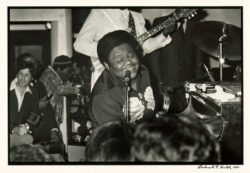Fats Domino
New Orleans pianist and singer Antoine "Fats" Domino is revered as a founding father of rock & roll, along with Elvis Presley, Chuck Berry, Little Richard, and Jerry Lee Lewis.

The Historic New Orleans Collection
Fats Domino on Steamship President.
New Orleans pianist and singer Antoine “Fats” Domino (born February 26, 1928) is revered as a founding father of rock ‘n’ roll, alongside Elvis Presley, Chuck Berry, Little Richard, and Jerry Lee Lewis. As such, he has profoundly influenced the popular music of the past half-century.
Domino differed distinctly from his seminal rock colleagues in one important sense. Although some observers disagree (including Domino biographer Rick Coleman), Domino maintained an almost asexual persona and stage presence that made him appear less rebellious and threatening than his peers. In addition, Domino’s repertoire included adaptations of Tin Pan Alley songs including “Blueberry Hill” and “Red Sails in the Sunset.” Domino put his own stamp on these numbers with his trademark pattern of piano triplet-figures and warm crooning. The former instrumental touch influenced both Jamaican ska music and swamp pop. As for his vocals, Domino’s thick New Orleans accent further distinguished his recordings.
Early Life and Musical Career
Domino’s parents and forebears were rural plantation workers who were raised speaking French. Born in New Orleans and raised in the city’s Lower Ninth Ward, Domino learned piano from his cousin, Harrison Verrett. Domino’s rise to fame was relatively quick and easy. After a rather short stint of playing local New Orleans bars including the Hideaway, Domino rose to the attention of Lew Chudd’s Imperial Records via trumpeter, songwriter, arranger, and producer Dave Bartholomew. Bartholomew supervised Domino’s first recording, “The Fat Man,” which rose to number two on the national rhythm and blues (R&B) charts early in 1950. The song was an adaptation of “The Junker Blues” by New Orleans blues pianist Champion Jack Dupree.
Thanks to his own prodigious talent, Bartholomew’s influence, and the technical skills of recording engineer Cosimo Matassa, Domino followed with a long and impressive string of top ten hits. These included “Ain’t That a Shame,” “Walking to New Orleans,” “I Want to Walk You Home,” Blue Monday,” “I’m Ready,” and “I’m Walking.” As a result he stands just behind Elvis Presley as the top-selling recording artist in early rock and roll (rock ‘n’ roll). Record sales were further spurred by Domino’s film appearances (The Girl Can’t Help It, Shake, Rattle and Rock, Jamboree, The Big Beat,) and guest performances on televisions shows hosted by Steve Allen, Ed Sullivan, Perry Como, and Dick Clark.
Domino’s peak success occurred during an era of intense creativity from the late forties through the early sixties. His initial success, along with that of other New Orleans musicians, convinced many major record companies that New Orleans studio musicians had a sound that guaranteed hits. (Notable among those accompanists were saxophonists Lee Allen, Alvin “Red” Tyler and Herbert Hardesty, guitarist Justin Adams, and drummer Earl Palmer.) As a result, musicians such as Little Richard were sent to record in New Orleans at Cosimo Matassa’s studio, with such successful results as “Tutti Frutti.”
Later Career and Cultural Significance
This distinct regional flavor shaped Domino hits such as “I’m Walking,” with its syncopated, second line beat that illustrated the close connection between New Orleans R&B, traditional jazz, and Afro-Caribbean folk roots. In a broader sense, this stylistic commonality underscores the ambiguity of musical terms. “Well, what they call rock ‘n’ roll is rhythm and blues, and I’ve been playing it for fifteen years in New Orleans,” Domino said in 1956. Domino’s statement made the succinct, implicit point that musical terms come and go and continually change meanings over time. Further blurring the boundaries between categories, Domino also made successful forays into country music with “Valley of Tears,” “Whiskey Heaven,” and his exciting adaptation of Hank Williams’s “Jambalaya (On the Bayou).”
By the mid-sixties, Domino’s domination of the pop charts had ended, but his popularity never waned, and it remains strong even at this writing. Domino continued to tour until 1995. He preferred to live in his old neighborhood, despite the fact that he could have afforded to live anywhere. Domino’s rescue by boat from his house in 2005 after Hurricane Katrina was one of the more dramatic cultural moments of that disastrous event. The following year, Domino released an album of new material titled “Alive and Kicking,” which was acclaimed as a symbol of New Orleans’s determined resurgence. The genial Domino shone as a morale-boosting symbol of cultural pride and recovery.
In 2007, an assembly of stars contributed their renditions of Domino songs to the two-CD tribute album “Goin’ Home.” Participants included Paul McCartney, Neil Young, Norah Jones, Toots and the Maytals, Robbie Robertson, Robert Plant, Lucinda Williams, and Olu Dara, among many others. To celebrate “Goin Home’s” release, Domino made a public appearance at the famed New Orleans nightclub Tipitina’s.
Fats Domino passed away on October 24, 2017, after a long-term illness at the age of 89.
